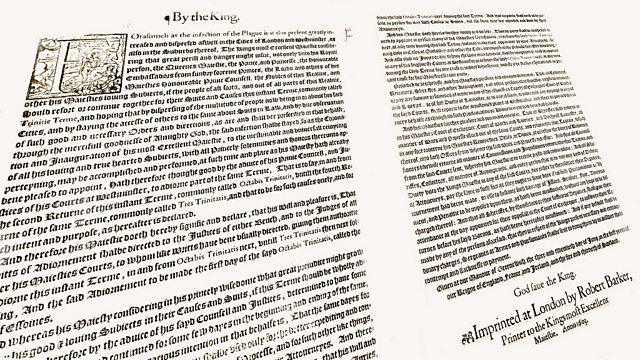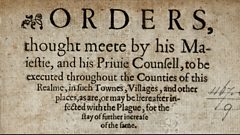17. Plague and the Playhouse
Neil MacGregor reveals the impact of the plague of 1603 through a series of early 17th-century proclamations. From May 2012.
May 1603 saw not only a new king but the worst plague outbreak since the Black Death. Its impact and reach is told through a series of early seventeenth century proclamations.
Object-based history series presented by Neil MacGregor, former Director of the British Museum.
Taking artefacts from William Shakespeare's time, he explores how Elizabethan and Jacobean playgoers made sense of the unstable and rapidly changing world in which they lived.
With old certainties shifting around them, in a time of political and religious unrest and economic expansion, Neil asks what the plays would have meant to the public when they were first performed.
He uses carefully selected objects to explore the great issues of the day that preoccupied the public and helped shape the works, and he considers what they can reveal about the concerns and beliefs of Shakespearean England.
Producer: Paul Kobrak
First broadcast on 成人快手 Radio 4 in May 2012.
Last on
More episodes
Plague Proclamations
Date: 1603 听
Made in: London 听
Made by: Unknown 听
Material: Paper 听
听
Shakespeare鈥檚 life was marked by plague. His life started at the height of the first great Elizabethan outbreak in 1563-4, when the plague wiped out a quarter of the population of Stratford.
听
Later, when he was working in the theatres of London, the plague was to return once again and change the shape of his career. In 1603, a fresh epidemic swept through London forcing the theatres to close for almost a year and leaving Shakespeare鈥檚 company little choice but to head out on the road to tour the provinces.
听
Meanwhile, the newly-crowned King James I had to with establish himself as the head of a people who were more than a little bit suspicious of Elizabeth鈥檚 Scottish cousin, while also faced with impossible task of protecting the nation from the advancing threat of the vile and deadly plague.
听
This object is from the
听
Quotations
Background
- Shakespeare was born during the first great Elizabethan plague outbreak (1563-4)
- In February 1564, the Lord Mayor prohibited the performance of plays because of the plague. This was probably the first time such a ban had been issued.
- The 1603 outbreak of plague was the most severe in England since the Black Death of the 14th century and about a fifth of London's population died.
- Print was one of the great weapons against the plague - proclamations were printed, distributed, read out in churches and town squares and then pinned on billboards and posts for all to read
- When the plague was not raging, instead of proclamations there would be playbills posted up to advertise the plays.
More from Radio 4: Boils and Buboes

Melvyn Bragg explores how alderman John Ivie saved the plague ravaged town of Salisbury in 1627. With extracts from Ivie's written personal accounts.
听
More from Radio 4: The Origins of Infectious Disease

Melvyn Bragg and his guests discuss the origins of infectious disease.
听
More from Radio 4: The Anatomical Renaissance

Thanks to a renaissance in anatomy in the 16th century, the art of surgery had been perfected in Bologna to the extent artificial but living noses, ears and lips could be supplied.
听
Broadcasts
- Tue 8 May 2012 13:45成人快手 Radio 4
- Tue 8 May 2012 19:45成人快手 Radio 4
- Tue 30 Oct 2012 14:15成人快手 Radio 4 Extra
- Tue 31 Mar 2015 14:15成人快手 Radio 4 Extra
- Wed 1 Apr 2015 02:15成人快手 Radio 4 Extra
- Tue 2 Aug 2016 13:45成人快手 Radio 4
- Tue 8 May 2018 14:15成人快手 Radio 4 Extra
- Wed 9 May 2018 02:15成人快手 Radio 4 Extra
- Tue 7 Nov 2023 07:15成人快手 Radio 4 Extra
- Tue 7 Nov 2023 12:15成人快手 Radio 4 Extra
- Tue 7 Nov 2023 17:15成人快手 Radio 4 Extra
- Wed 8 Nov 2023 02:15成人快手 Radio 4 Extra
Podcast
-
![]()
Shakespeare's Restless World
Neil MacGregor uncovers the stories 20 objects tell us about Shakespeare's world.



